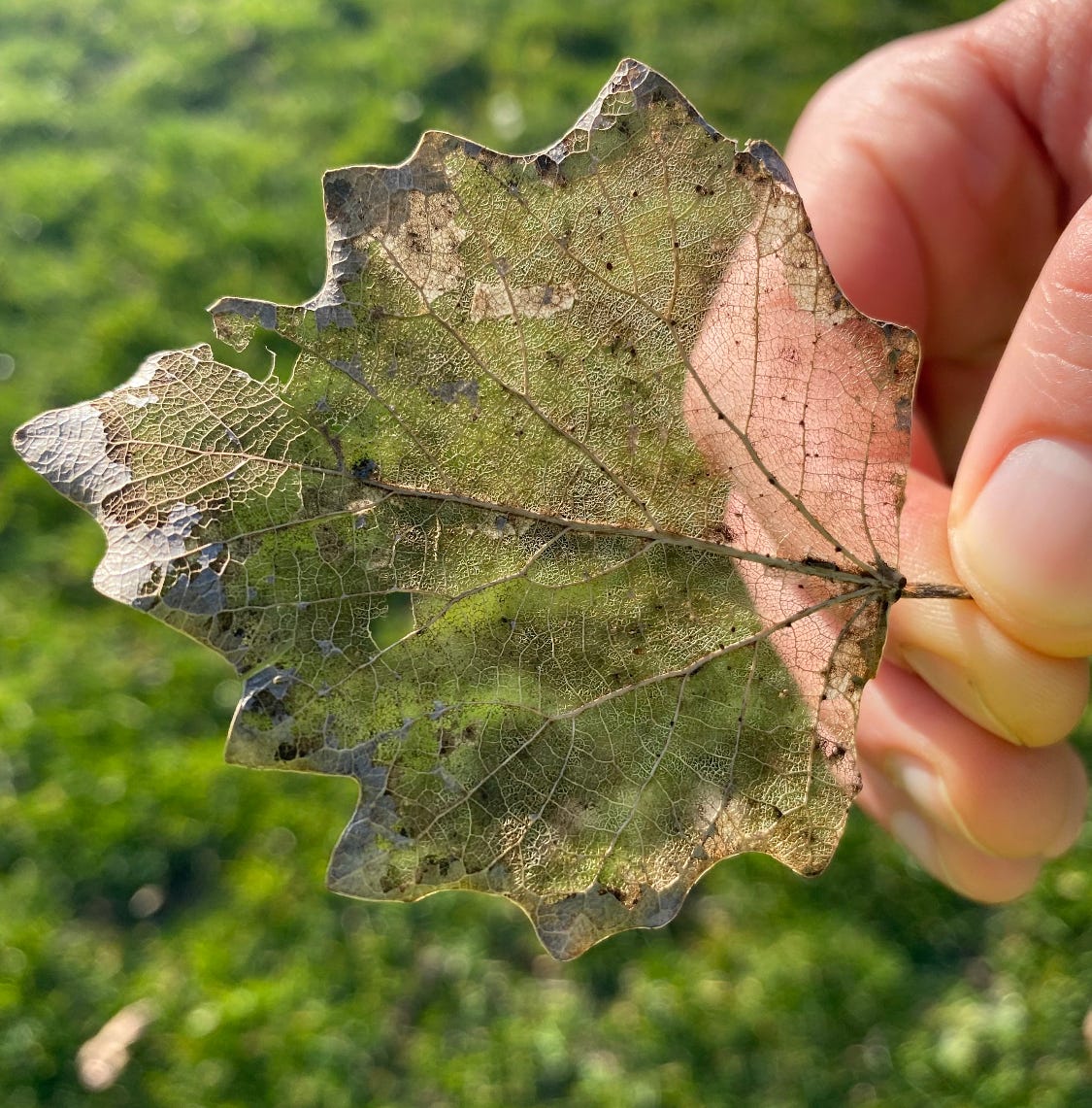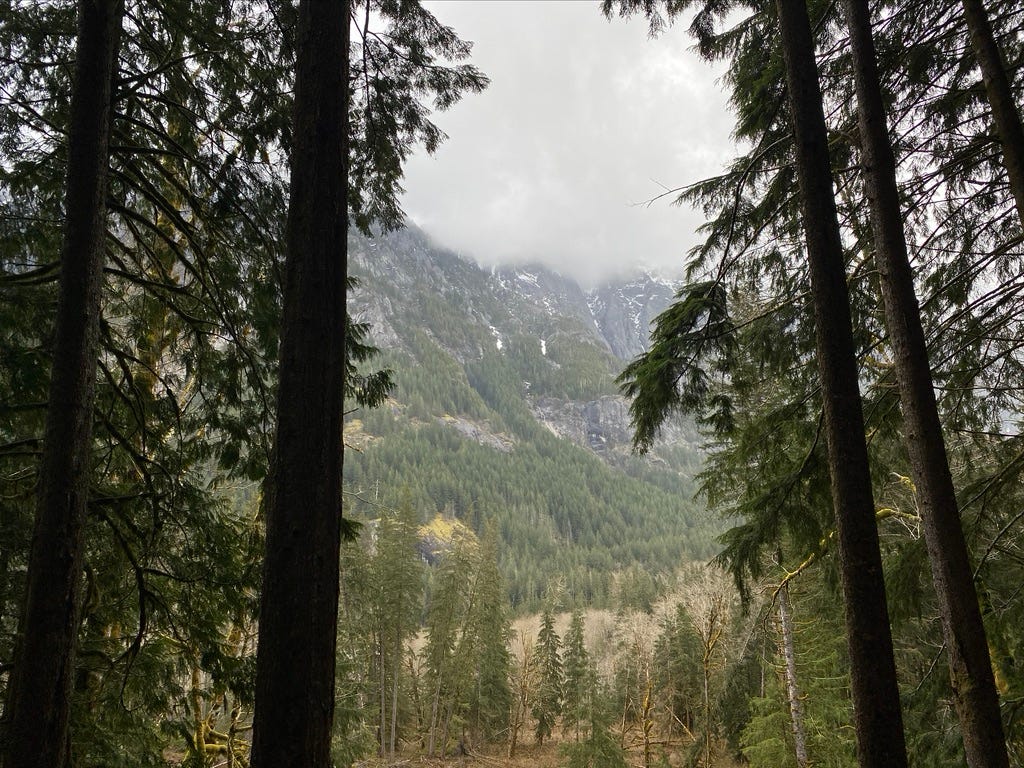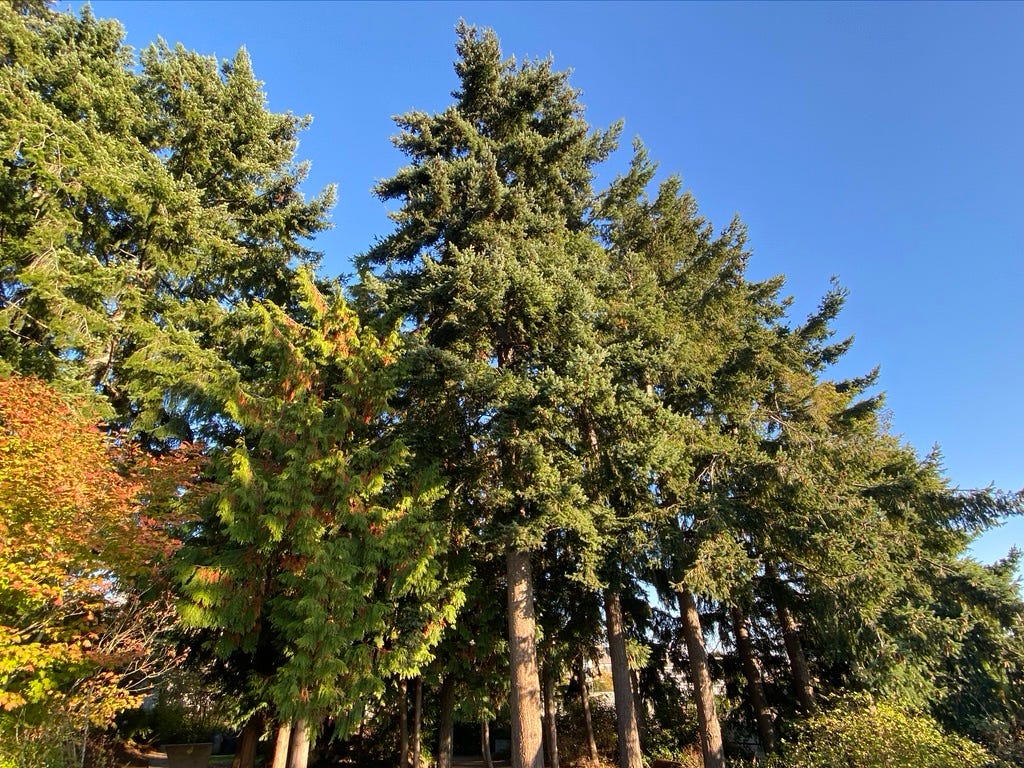The Condition Of Being Alive Represents An Act Of Extortion
We didn't ask for it, but it means we owe a debt
If you’ve been a reader of this newsletter for any length of time you probably know that I’m an avid, if amateurish, forager. I find few greater joys than poking around outside and coming home with my pockets full of various needles, seeds, flowers, and berries.
Recently I have tried to make a habit of saying thank you out loud to any plant I take parts from. (I whisper, usually; I still care too much about what strangers think of me.) I also try to make sure I say Wow out loud any time the suns and cloud conspire to give me a full view of the mountains. We are rapidly approaching the time of year when this happens almost daily in Seattle, and perhaps the habit will diminish from overuse, but it’s been awfully dreary lately and the rare clear days still feel like gifts.
This sounds like hippie bullshit and maybe it is. But I persist. I say these things to the trees and mountains and sky not because I think the recipients can actually hear me—at least in the sense that people understand hearing things—but because I think it’s good to make sure I’m not taking things for granted.
I do not want to take things for granted. I would like to tread lightly in the world, to whatever degree such a thing is possible. There is no life out there removed from participation in destructive systems and practices, but I hope it’s possible to use that knowledge as a jumping off point for introspection about one’s priorities without being driven mad with guilt or paralyzed by the scale of the horrors.1
As the novelist Rachel Cusk puts it:
Most people live cosseted in the vague belief that their existence and the work that they do are essentially nondestructive, but hardly anyone in our era could really say that about themselves. These days, the very condition of being alive represents an act of extortion. Our neighbor was merely making his extortion audible and visible. I watched the workers — local men, it seemed — from the garden, unable to understand their talk and so reading instead their mannerisms and gestures, their bearing toward one another and their employer. They seemed gentle and respectful. They weren’t responsible for the destruction and the noise, yet these things, and the change that would result from them, were their work.
They seemed gentle and respectful, they weren’t responsible for the destruction, and yet it was their work. Our lives are extractive, and we are accustomed to taking so much, and giving so little back. Much of this is certainly beyond our control. But that’s all the more reason to work against that default state of extraction where we can.
This is not to say that I think foraging, when done properly, is a destructive activity, extractive as it may be. It is possible to move through the natural world in such a way as to not only reduce one’s capacity for harm, but to actively do good. Early on in Robin Wall Kimmerer’s Braiding Sweetgrass she mentions asking her students if such a thing was possible, for humans to have a positive impact on their environment. They universally believed the answer to be no. Until she took them out into the field, they had never been exposed to any idea other than that humans are destroying the planet, top to bottom.
But respectful, attentive foraging is not just sustainable—it can even be a beneficial environmental practice. Some invasive species are downright tasty; some indigenous species need outside assistance to proliferate. Mushroom hunters carry their treasures in mesh bags to allow fungal spores to rain back down on the soil. There are other positive interventions: controlled burns don’t just cut down on manmade forest fires, they help open the tight seed cones of the world’s biggest trees. It’s no secret that we’re doing damage to the world at a far quicker rate than we are participating in these healing practices. Still, I call attention to them for the same reason that we cannot help but point out the stars in the vast blackness of the night sky.
When I say there is no life out there removed from the horrors, no prefigured utopia we can step into in perfect retreat from society, I say that with clear eyes. We are all part of this world, meaning we all participate, and if we all must participate, then we all have obligations. This is not to say that we all share the blame equally; the American insistence on collapsing systemic analysis into individual moralizing is a habit that can come to no good end. Nevertheless we are all here, for now, and as a result we can contribute. (Of course none of us asked to be here but that has been the human condition for the entirety of our existence and the love and wonder and consciousness we get to experience feel like pretty good compensation.)
I started writing this missive a few days ago, when all that was on my mind was what I owed the natural world in return for what I take. But recent events have given me cause to remember that humans themselves are a part of that natural world, and so we owe one another a great deal, too. When it comes to the people made vulnerable by the decrepit, soulless maw that governs us here in this country, it is not enough to simply tread lightly, to try to do no harm. We must be conscious, determined actors in defense of those who are having their lives, rights, and freedoms stripped away—not just because “we might be next,” but because our own humanity is bound up in everyone else’s. To outlaw abortion, stripping hundreds of millions of people of their reproductive freedom and bodily autonomy, is a thing so putrid I can barely find the words for it.2
I don’t know what happens next. I do know that “Get out and vote harder!” is not and never has been an actual solution to anyone’s real problems, even if not voting is often even worse. The people in charge do not give a shit about us and most of them aren’t even really trying to pretend otherwise anymore. So it’s on us to give a shit about each other. Giving some money is the quickest and one of the most impactful things you can do (please check out the link below) but I urge you to think hard and creatively about what else you have to offer in defense of people who need it. I will be, too.
Thanks, as always, for reading. These are dark times and I sincerely appreciate having this little newsletter community to talk to.
-Chuck
PS - If you liked what you read here, why not subscribe and get this newsletter delivered to your inbox each week? It’s free and always will be, although there is a voluntary paid subscription option if you’d like to support Tabs Open that way.
good luck though lol
Despite all the ire I have for the fundamentalist right-wing freaks who have spent the last half-century trying to make this happen, I still have plenty in the tank left for the leadership of the Democratic Party, which has spent that same amount of time raking in cash and votes by holding the specter of a Republican abortion ban over people’s heads while doing absolutely nothing to codify the right to one into law. Days like today I imagine it would be very satisfying to believe in Hell.




